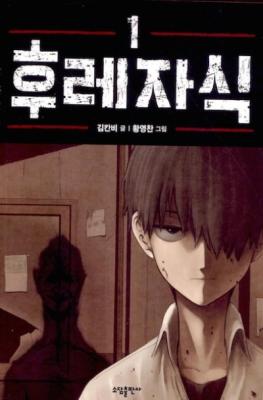...yet somehow not nihilistic -- quite the opposite, actually. Despite the horrors (both visceral and psychological) that these young characters undergo, they're still hopeful, and that's what ultimately makes this story so heartbreaking. More than anything, Bastard is a dark human drama, and that's where it succeeds brilliantly. Suspense is tied so tightly to the emotions and actions of the characters that it can be, at times, stressful to read. But there is no shortage of quiet moments that, to use an old cliche, tug at the heartstrings, and these two moods work well off each other to bring together this emotional thriller. As expected of Carnby, this webtoon, while by no means gratuitous, is brutal in its depictions of violence -- it's probably not for the faint of heart, though I can't help but recommend it to them anyway for its beautifully done psychological side. Because beyond all the violence of its premise, there's a uniquely human story being told that transcends it. If you'd prefer to go in blind without spoiling the chapter 3 reveal, then don't read the rest of this review.
Protagonist Jin Seon is the child of a serial killer -- and his forced accomplice. His body is weak from a traumatic childhood "accident," he has no friends and is the victim of bullying and harassment from his classmates despite being the son of a millionaire, and his mind is close to being in shambles from the severe psychological abuse inflicted on him by his father (and what his father makes him do). We later find out that while he's quite familiar with women's bodies in the most literal sense of the word, he has absolutely no idea what sex and porn are, and while he's seen more of the world's evil in his short life than the average person will ever see in a lifetime, he's incredibly naive culturally and socially. Honestly, it's fascinating and refreshing to follow the development of such a seemingly contradictory character who completely makes sense in his own context. For that reason alone, I would recommend this webtoon.
The secondary characters are no less intriguing. Kyun Yoon, the peppy but secretly destitute and struggling romantic lead, is a great foil for Jin. Unlike him, she had a father who meant everything to her and whose untimely passing she's still struggling to cope with. She lives in squalor with her grandfather, whose dementia renders him entirely dependent on her. Without knowing his circumstances, she chides Jin for not appreciating the father he still has and for being a "naive rich kid." She's strong-willed but also sensitive and motherly, and her interactions with Jin, when not playing out as lightly tsundere comedy routines, are genuine and heartfelt.
On the other side of the spectrum is Manny Kim, influential school bully and son of the CEO of Jin's father's rival company. While at first seeming to be a generic antagonistic force against Jin, Manny slowly but surely develops as a well-rounded character in his own right, displaying a realistic love-hate tug-of-war in his relationship with Jin. Once he develops an interest and a tentative friendship with him, he doesn't drop his bitter, belligerent lifestyle for his more sensitive and socially conscious one but rather oscillates between the two until they can't coexist any longer. The way his character growth is handled is as moving as it is painfully realistic.
In regards to the plot, it begins fairly scattered, laying the groundwork for the story and giving us glimpses into the shared double life of this very disturbed (in different ways) father and son duo. A more focused and linear plot line emerges out of this foundation while also continuing to build on it, creating a solid, engaging, and immersive story world, a perfectly successful backdrop for these characters. And since this is a psychological thriller, the story and characters are so inextricably bound to each other that in a way, the gloomy, muddled darkness of the plot takes on a sort of brooding, antagonistic character itself. Everything feels very cohesive and fluid while also managing to keep you on the edge of your seat without feeling convoluted or underdeveloped.
The art is both heavily stylized at times and drearily realistic, to great effect. The nightmare faces Jin's father frequently makes contrast wildly with the peaceful softness of Kyun holding a fearful or crying Jin. Simply stated, the art enriches the varying moods of the story without being distracting or out of place. Hwang opts for more neutral and subdued shades in his palette, relying primarily on grays and muted browns. Far from detracting from the overall quality of the work or exuding the pretension of "real is brown," I think the color choice really brings out the moody grittiness of the story without looking washed out, and by contrast, it makes moments of lightness stand out all the better. It's certainly beautiful in its own subtle, Gothic way.
[There aren't many chapters of this webtoon out in English yet, but I've been reading it from the start (sixteen weeks at the time of this writing), and it's continued to impress me with its depth and scope. So while I won't rate it for now, I very heartily recommend it and will continue to follow it avidly.]
Review expanded forty weeks after the initial writing. I'm giving it a 9 out of 10 for now, which I'll be more than happy to bump up to a 10 if it concludes in a satisfying manner. As of right now, Bastard still stands highly recommended by me.





